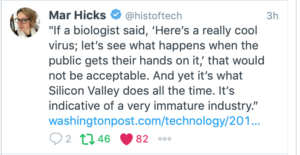”To ask whether computers can think is like asking whether submarines can swim”
Category Archives: Quotes
Quote of the Day
“When you have seen the Hitlerjugend in action you become very wary of team spirit”
Edsger Dijkstra
Quote of the Day
“Computers are like humans. They do everything except think”
John von Neumann
Word-processing vs. writing
While you sit at your computer now, the world seethes behind the letters as they appear on the screen. You can toggle to a football match, a parliamentary debate, a tsunami. A beep tells you that an e-mail has arrived. WhatsApp flashes on the screen. Interruption is constant but also desired. Or at least you’re conflicted about it. You realize that the people reading what you have written will also be interrupted. They are also sitting at screens, with smartphones in their pockets. They won’t be able to deal with long sentences, extended metaphors. They won’t be drawn into the enchantment of the text. So should you change the way you write accordingly? Have you already changed, unwittingly?
Or should you step back? Time to leave your computer and phone in one room, perhaps, and go and work silently on paper in another. To turn off the Wi-Fi for eight hours. Just as you once learned not to drink everything in the hotel minibar, not to eat too much at free buffets, now you have to cut down on communication. You have learned how compulsive you are, how fragile your identity, how important it is to cultivate a little distance. And your only hope is that others have learned the same lesson. Otherwise, your profession, as least as you thought of it, is finished.
Quote of the Day
“What can convey the veritable brain-washing, the total preoccupation, the drugged and haunted condition which this new poet induced in some of us? We were like new-born goslings forever imprinted with the image of an alien and indifferent foster parent, infatuated with his erudition, his sophistication, yet sapped and ruined by the contagion of his despair.”
Cyril Connolly on the impact of TS Eliot’s The Waste Land on his generation.
Quote of the Day
“Good economists know that the correct answer to any question in economics is: it depends.”
Dani Rodrik, “Rescuing economics from Neoliberalism”
Quote of the Day
Quote of the Day
A New Yorker cartoon shows two teenage girls in conversation. One says: “I’m at that point in my life when I don’t want my parents to tell me what to do but I still want to blame them for it”.
Quote of the Day
“Few things have done more harm than the belief on the part of individuals or groups (or tribes or states or nations or churches) that he or she or they are in sole possession of the truth.”
Isaiah Berlin
Quote of the day
“Needing to have reality confirmed and experience enhanced by photographs is an aesthetic consumerism to which everyone is now addicted. Industrial societies turn their citizens into image-junkies; it is the most irresistible form of mental pollution.”
Susan Sontag, in On Photography


